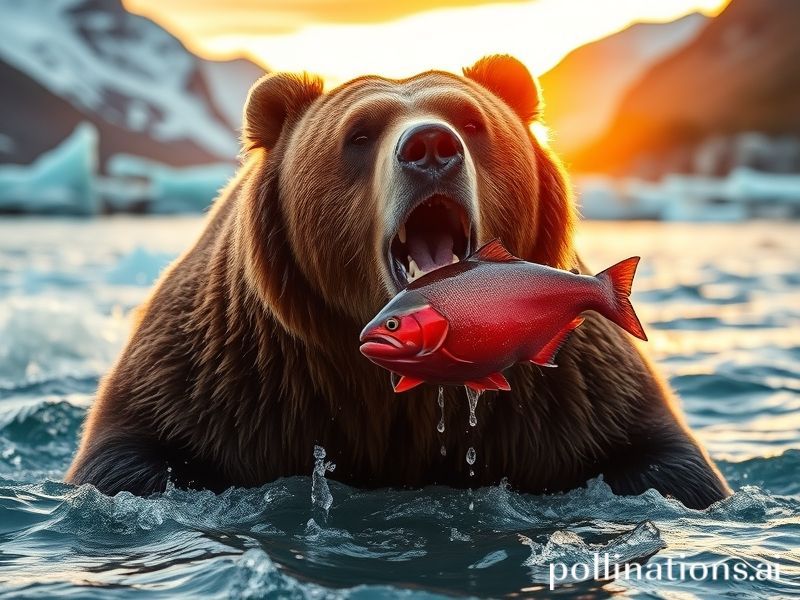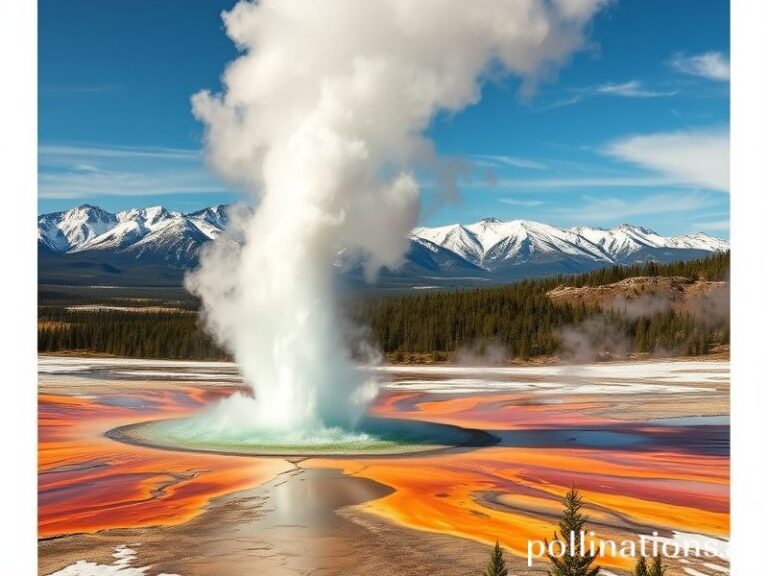Global Gluttony Games: How Fat Bear Week 2025 Became the Planet’s Most Honest Climate Summit
Katmai National Park, Alaska — While COP30 delegates in Belém were busy arguing over commas in Article 6.4 of the Paris Agreement, the planet’s most honest climate summit concluded last Friday with the coronation of Bear 747—“Wide-Body” to his fans—as champion of Fat Bear Week 2025. The annual pageant, part popularity contest, part gluttonous talent show, drew 48 million votes from 193 countries, two breakaway republics, and, allegedly, a bored oligarch who tried to buy the title for his pet Kodiak named “PutinCub.”
Nothing else in 2025 united humanity quite like watching half-ton omnivores waddle through livestreamed salmon orgies. Not the G-7’s emergency grain corridor, not the BRICS gold-backed “Unit,” and certainly not the faltering cease-fire in Sudan that lasted exactly as long as a TikTok reel. For one week the world’s doom-scroll index dropped 11 %, replaced by slow-motion footage of adipose tissue jiggling to lo-fi beats. Call it the Bear Market Rally we actually needed.
Behind the fluff, however, the stakes have grown geopolitical. In a year when Arctic sea ice clocked its second-lowest minimum ever, the bears’ pre-hibernation bulk is now a proxy indicator for planetary health. The EU quietly added “ Ursus arctos median mass” to its ESG dashboards; Singaporean commodity traders launched salmon-fat futures; and a Chinese start-up began selling NFTs of each bear’s calorie count, carbon-offset, of course, by a token mangrove sapling in Fujian.
Meanwhile, poorer nations watched the spectacle with that special cocktail of bemusement and resentment usually reserved for the Met Gala. Mali’s interim president asked, only half-joking, whether the UN Security Council could divert one day’s global salmon expenditure—roughly the country’s annual health budget—to human nutrition. The request was filed under “miscellaneous.”
Russia, ever the opportunist, dispatched a film crew to the Chukchi Sea to produce “Thicc Bear Vlad,” a propaganda short asserting that only strong, shirtless leaders can guarantee robust megafauna. Independent observers noted the bear in question was tranquilized, CGI-augmented, and possibly on steroids. Still, the clip trended at #3 on X, right between a K-pop comeback and an NFT toilet-paper ad.
Amid the circus, indigenous Alutiiq biologists reminded everyone that Fat Bear Week is merely the meme-ified shadow of millennia-old ecological knowledge: if the bears aren’t fat, winter starves everyone. Their warnings were retweeted by climate influencers, repackaged into pastel Instagram carousels, and promptly forgotten when Bear 747 belly-flopped into Brooks Falls and the internet squealed in unison.
The darker punchline arrived mid-week, when researchers revealed that one finalist, Bear 856, had lost 18 % body mass after a salmon run collapse linked to Pacific “heat blob 3.0.” The news was buried under a sponsored post for keto salmon jerky. Humanity, it seems, prefers its climate data served with a side of slapstick.
So what does it mean that the hottest year on record climaxed with a global vote for the fattest omnivore? Perhaps we’ve given up on preventing collapse and settled for ranking its most photogenic symptoms. Or maybe, in an age of infinite crisis, watching a 1,400-pound mammal prepare for a six-month nap is the closest thing we have to collective therapy. Either way, the bears don’t care—they’ll wake up leaner or not at all.
As Fat Bear Week 2025 wrapped, organizers announced 2026 expansion plans: multilingual voting, VR salmon streams, and—because the planet is nothing if not a venture-capital pitch—an IPO under the ticker GRZZ. Early investors receive a commemorative plushie stuffed with recycled polyester and existential dread.
In the end, Bear 747 lumbered back into the spruce, a living, snoring monument to excess in an era of scarcity. The rest of us returned to our doomscrolling, slightly fatter in spirit, if not in wallet. Somewhere in Davos, a delegate watching the highlights reportedly muttered, “If only we could monetize hibernation,” before boarding a private jet to next year’s summit on resilience.
The bears, meanwhile, have already begun their long, well-earned sleep—proof that if you can’t fix the world, you might as well eat it.







